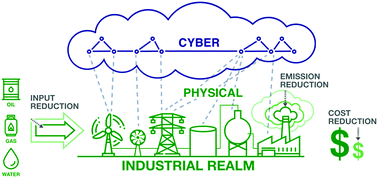当前位置:
X-MOL 学术
›
Energy Environ. Sci.
›
论文详情
Our official English website, www.x-mol.net, welcomes your
feedback! (Note: you will need to create a separate account there.)
The impact of intelligent cyber-physical systems on the decarbonization of energy
Energy & Environmental Science ( IF 32.4 ) Pub Date : 2020/02/14 , DOI: 10.1039/c9ee01919g Oliver Inderwildi 1, 2, 3, 4, 5 , Chuan Zhang 4, 5, 6, 7, 8 , Xiaonan Wang 4, 5, 6, 9, 10 , Markus Kraft 4, 5, 6, 11, 12
Energy & Environmental Science ( IF 32.4 ) Pub Date : 2020/02/14 , DOI: 10.1039/c9ee01919g Oliver Inderwildi 1, 2, 3, 4, 5 , Chuan Zhang 4, 5, 6, 7, 8 , Xiaonan Wang 4, 5, 6, 9, 10 , Markus Kraft 4, 5, 6, 11, 12
Affiliation

|
The decarbonisation of energy provision is key to managing global greenhouse gas emissions and hence mitigating climate change. Digital technologies such as big data, machine learning, and the Internet of Things are receiving more and more attention as they can aid the decarbonisation process while requiring limited investments. The orchestration of these novel technologies, so-called cyber-physical systems (CPS), provides further, synergetic effects that increase efficiency of energy provision and industrial production, thereby optimising economic feasibility and environmental impact. This comprehensive review article assesses the current as well as the potential impact of digital technologies within CPS on the decarbonisation of energy systems. Ad hoc calculation for selected applications of CPS and its subsystems estimates not only the economic impact but also the emission reduction potential. This assessment clearly shows that digitalisation of energy systems using CPS completely alters the marginal abatement cost curve (MACC) and creates novel pathways for the transition to a low-carbon energy system. Moreover, the assessment concludes that when CPS are combined with artificial intelligence (AI), decarbonisation could potentially progress at an unforeseeable pace while introducing unpredictable and potentially existential risks. Therefore, the impact of intelligent CPS on systemic resilience and energy security is discussed and policy recommendations are deducted. The assessment shows that the potential benefits clearly outweigh the latent risks as long as these are managed by policy makers.
中文翻译:

智能网络物理系统对能源脱碳的影响
能源供应的脱碳是管理全球温室气体排放并因此缓解气候变化的关键。大数据,机器学习和物联网等数字技术正受到越来越多的关注,因为它们可以帮助脱碳过程同时需要有限的投资。这些新技术的编排,即所谓的网络物理系统(CPS),可提供进一步的协同效应,从而提高能源供应和工业生产的效率,从而优化经济可行性和环境影响。这篇全面的评论文章评估了CPS中数字技术对能源系统脱碳的当前以及潜在的影响。特别指定CPS及其子系统的选定应用的计算不仅估算了经济影响,而且估算了减排潜力。该评估清楚地表明,使用CPS对能源系统进行数字化完全改变了边际减排成本曲线(MACC),并为过渡到低碳能源系统创造了新的途径。此外,评估得出的结论是,当CPS与人工智能(AI)结合使用时,脱碳可能会以无法预料的速度发展,同时会带来不可预测的潜在潜在风险。因此,讨论了智能CPS对系统弹性和能源安全的影响,并推论了政策建议。评估显示,只要由政策制定者管理,潜在收益显然超过潜在风险。
更新日期:2020-03-19
中文翻译:

智能网络物理系统对能源脱碳的影响
能源供应的脱碳是管理全球温室气体排放并因此缓解气候变化的关键。大数据,机器学习和物联网等数字技术正受到越来越多的关注,因为它们可以帮助脱碳过程同时需要有限的投资。这些新技术的编排,即所谓的网络物理系统(CPS),可提供进一步的协同效应,从而提高能源供应和工业生产的效率,从而优化经济可行性和环境影响。这篇全面的评论文章评估了CPS中数字技术对能源系统脱碳的当前以及潜在的影响。特别指定CPS及其子系统的选定应用的计算不仅估算了经济影响,而且估算了减排潜力。该评估清楚地表明,使用CPS对能源系统进行数字化完全改变了边际减排成本曲线(MACC),并为过渡到低碳能源系统创造了新的途径。此外,评估得出的结论是,当CPS与人工智能(AI)结合使用时,脱碳可能会以无法预料的速度发展,同时会带来不可预测的潜在潜在风险。因此,讨论了智能CPS对系统弹性和能源安全的影响,并推论了政策建议。评估显示,只要由政策制定者管理,潜在收益显然超过潜在风险。











































 京公网安备 11010802027423号
京公网安备 11010802027423号